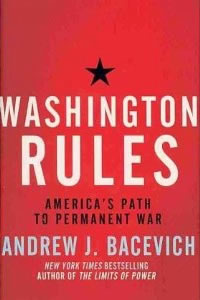Book Notes
 Andrew J. Bacevich, Washington Rules; America's Path to Permanent War (New York: Metropolitan Books, 2010), 286pp.
Andrew J. Bacevich, Washington Rules; America's Path to Permanent War (New York: Metropolitan Books, 2010), 286pp.
Andrew Bacevich graduated from West Point, spent twenty-three years in the military, and later earned a PhD from Princeton, but by 2003 his long-held neo-conservative beliefs about the "benign purposes of American power" had so completely crumbled that he now considers them "preposterous." This book is his latest effort to subvert the conventional wisdom that rules in Washington, "namely the package of assumptions, habits, and precepts that have defined the tradition of statecraft to which the United States has adhered since the end of World War II." Instead of seeing war as a grievous last resort to be avoided at all costs, we now have the complete militarization of statecraft and the economy, "a condition of permanent national security crisis" or "semiwar." The Pentagon has openly embraced what they call a Long War that, they promise, has no foreseeable end and will thus last for many decades.
Our American "credo," as Bacevich calls it, requires the United States, and only the United States, "to lead, save, liberate, and ultimately transform the world." Most people find this self-appointed prerogative both reassuring and benign. To carry out this mission, we have also developed military means of "staggering excess" to accomplish a "sacred trinity" of ends: a global military presence, global power projection, and global interventionism. The credo and the trinity are the rules in Washington, and what rules Washington. They exert influence far beyond mere party affiliation or who occupies the White House.
In six short chapters Bacevich shows how the credo and trinity evolved, questions their basic assumptions, explains how and why these rules persist in Washington, argues that these rules are not only imprudent but unsustainable, and then proposes his own view of statecraft so as to "legitimate alternatives to the status quo." And "Washington," in his view, includes not only legislators and presidents, but also Wall Street financiers, military contractors, lobbyists, think tank "experts," and the media, that is, all who confess the credo and bow down to the sacred trinity.
Beyond the "stupendously profligate" costs in blood and treasure for permanent war, there are other costs just as real but harder to measure: "families shattered by loss; veterans bearing the physical or psychological scars of combat; the perpetuation of ponderous bureaucracies subsisting in a climate of secrecy, dissembling, and outright deception; the distortion of national priorities as the military-industrial complex siphons off scarce resources; environmental devastation produced as a by-product of war and the preparation for war; the evisceration of civic culture that results when a small praetorian guard shoulders the burden of waging perpetual war, while the great majority of citizens purport to revere its members, even as they ignore or profit from their service" (223–224).
Bacevich has little hope that the rules of Washington will change. After all, there have always been non-conformists like William Fulbright and his book The Arrogance of Power (1966), but such prophets "rarely matter," says Bacevich. He's also aware of the charges of romanticism and isolationism. Nonetheless, in his last few pages he proffers an alternate "trinity" in which America leads by example rather than military coercion. If we fail to wrestle with the "glaring contradiction" and hypocrisy of promising peace and prosperity while advocating permanent semiwar, he says, "over the horizon a shipwreck of epic proportions awaits."


